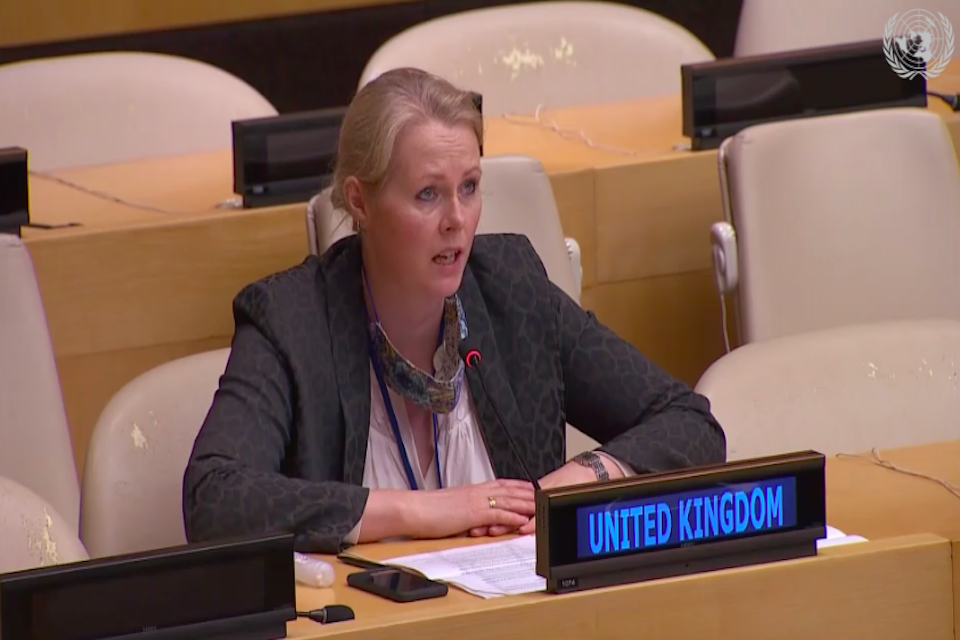The challenges and opportunities facing Guinea-Bissau
Statement by Sonia Farrey, UK Political Coordinator the UN, at the Security Council briefing on Guinea-Bissau.

Thank you Mr President, first I’d like to join others to extend condolences to France and Niger for all those killed in yesterday’s attacks in Niger.
Mr President, let me start by thanking SRSG Sori-Coulibaly and all the briefers for setting out clearly the challenges and opportunities facing Guinea-Bissau.
At the briefing in February, we welcomed the peaceful conduct of the presidential election and expressed concern at the risks posed by the post-electoral fallout. Unfortunately, many of these risks have since been realised.
Firstly, the Bissau-Guinean military have taken an active and unwelcome role in politics. On 2 March, they occupied the Supreme Court of Justice, disrupting the ongoing legal challenge to the election results, and on 7 May, they briefly occupied the People’s National Assembly building, preventing parliamentarians from entering.
Secondly, we have seen reports of sustained violence and intimidation against political opponents, including MPs Marciano Indi and Armendo Dias and former Prime Minister Aristides Gomes, as well as judges and journalists, including on 26 July the vandalism of the premises of Radio Capital FM.
Thirdly, the new authorities appear to have turned a blind eye to drug traffickers, with reports of increased trafficking and no reported seizures. The serious drug-trafficking offender, Braima Seidi Bá, who was convicted and sentenced by a Bissau-Guinean court in March 2020 is not serving his sentence and is reportedly operating in Guinea-Bissau under military protection. This should not be the case. This is a flagrant breach of the country’s own judicial system.
This destabilising conduct by the new authorities comes at a great cost to the Bissau-Guinean people, who, suffering in poverty, compounded by the coronavirus, expect and deserve more from their leaders.
However, there are also opportunities. Opportunities for the Bissau-Guinean government to show that it takes its responsibility to its people seriously. We call on the government to take these opportunities by demonstrating inclusive governance, by solving problems through dialogue and by enacting crucial political reforms. These include the urgent revision of the constitution under the authority of the National People’s Assembly, and the implementation of the National Strategic Action Plan on Countering Drug Trafficking and Organised Crime.
The government should feel supported in taking these important steps. In this regard, we welcome ECOWAS’s role in mediating the ongoing political crisis and call on ECOWAS to remain united, to keep the interests of the Bissau-Guinean people foremost, and to strengthen their presence in Bissau in order to monitor and ensure the proper implementation of their decisions and of the reforms agenda.
We call also on the Group of Five and the international community to support Guinea-Bissau and to encourage its new authorities to live up to their responsibilities. In this regard, we support the Secretary General’s recommendations, in particular the establishment of the High-Level Platform to accompany the reforms agenda and the establishment of an Independent National Human Rights Institution compliant with the Paris Principles.
In conclusion, as UNIOGBIS prepares to withdraw from Guinea-Bissau, on behalf of the United Kingdom, I would like to thank Ms Sori-Coulibaly and the UNIOGBIS staff for their efforts and to congratulate them on having done a good job in difficult circumstances – thank you. We hope that Guinea-Bissau’s leaders can take the responsibility to build on UNIOGBIS’s efforts, move past the challenges, and realise the opportunities to carry Guinea-Bissau into a stable and democratic future that its people deserve.